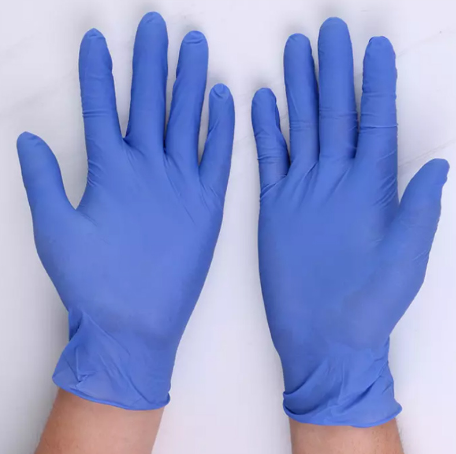Nitrilhandschuhe werden oft für ihre Widerstandsfähigkeit gegen eine Vielzahl schädlicher Chemikalien gelobt. Aber wovor genau schützen sie sich?, und was sind ihre Grenzen?? Lassen Sie uns tiefer eintauchen.
Zunächst, Handschuhe aus Nitril zeichnen sich durch den Schutz Ihrer Hände vor Ölen aus, Fette, und verschiedene erdölbasierte Substanzen. Sie wirken wirksam als Barriere gegen viele organische Lösungsmittel, Laugen, und Säuren. Im Wesentlichen, beim Umgang mit Chemikalien, die eine Gefahr für Ihre Haut darstellen, Das Tragen von Nitrilhandschuhen wird dringend empfohlen.
dennoch, Nitrilhandschuhe sind nicht makellos. Sie bieten keinen umfassenden Schutz gegen alle Chemikalien und können von bestimmten Stoffen durchdrungen werden. Zum Beispiel, Nitrilhandschuhe schützen nicht vor Ketonen, Acetate, konzentrierte Säuren, und stark ätzende Chemikalien. Und gleichzeitig bieten sie eine gewisse Resistenz gegen Giftstoffe wie Blei und Arsen, Sie sind gegenüber diesen Substanzen nicht völlig unempfindlich.
Deswegen, beim Umgang mit Chemikalien, Es ist wichtig, gründliche Untersuchungen durchzuführen, um zu bestätigen, dass Nitrilhandschuhe einen ausreichenden Hautschutz bieten. In diesem Blogbeitrag, Wir werden untersuchen, vor welchen Chemikalien Nitrilhandschuhe schützen und vor welchen nicht. Lass uns anfangen!
Großhandel mit Einweg-Nitrilhandschuhen für medizinische Zwecke
Was Nitrilhandschuhe so außergewöhnlich macht?
Handschuhe aus Nitril, aus synthetischem Material gefertigt, besitzen antiallergische Eigenschaften und werden im medizinischen Bereich häufig wegen ihres Schutzes gegen eine Vielzahl von Chemikalien eingesetzt. Bestehend aus Acrylnitril, Butadien, und Carbonsäuremonomere, Nitrilhandschuhe weisen im Vergleich zu Latexhandschuhen eine höhere Durchstoßfestigkeit auf, Dies macht sie zu einer vorherrschenden Wahl in medizinischen Anwendungen.
Diese Handschuhe verhindern Kreuzkontaminationen und dienen als hervorragender Schutz gegen gefährliche Substanzen. Wird aus synthetischem Kautschuk und nicht aus Naturkautschuk gewonnen, Nitrilhandschuhen fehlen Latexproteine, die Auslöser allergischer Reaktionen, die ausschließlich bei Naturkautschuk auftreten. Die Verwendung von Nitrilhandschuhen stellt eine außergewöhnliche Vorsichtsmaßnahme gegen mögliche Hautreaktionen dar. Bezüglich ihrer Sicherheit beim Umgang mit Lebensmitteln, Die Entscheidung für puderfreie Nitrilhandschuhe gewährleistet deren vollständige Lebensmittelsicherheit.
Ihre vielfältigen Schutzfähigkeiten sorgen für Sicherheit für sich selbst und andere. jedoch, Das wirft die Frage auf: Wovor genau schützen sie sich??
Warum es so wichtig ist zu erfahren, was Nitrilhandschuhe leisten & Schützen Sie sich nicht davor
Das Verstehen ihrer Grenzen schützt sowohl Sie selbst als auch andere – ähnlich wie das Verstehen der Einschränkungen von Einweg-Gesichtsmasken. Einweg-Gesichtsmasken, bestehend aus Nitril, ein synthetischer Kautschuk, werden in Krankenhäusern häufig eingesetzt, um die Übertragung von Infektionen zu verhindern.
In verschiedenen Umgebungen wie der Essenszubereitung, Einweghandschuhe aus Nitril werden eingesetzt, um Kreuzkontaminationsrisiken zu mindern. jedoch, Einweg-Gesichtsmasken bieten keinen umfassenden Schutz gegen Bakterien und Viren. Diese Art von Kleidung hat die Vorteile der Hydrophobizität, Ihre Wirksamkeit lässt nach, wenn sie nicht ordnungsgemäß aufrechterhalten wird. Bei längerer Verwendung einer Einweg-Gesichtsmaske kann es zu Feuchtigkeit kommen, Schaffung eines Nährbodens für Bakterien.
Es ist wichtig zu wissen, dass Nitrilhandschuhe einen begrenzten Schutz vor Chemikalien bieten. Die Arbeit mit wirksamen Chemikalien erfordert zusätzliche Sicherheitsmaßnahmen, die über das ausschließliche Tragen von Nitrilhandschuhen hinausgehen. Selbst hochwertige Nitrilhandschuhe unterliegen Einschränkungen. Daher, ohne Verspätung, Lassen Sie uns untersuchen, welchen spezifischen Schutz Nitrilhandschuhe bieten können.
Welchen Schutz bieten Nitrilhandschuhe??
Wovor genau schützen Nitrilhandschuhe?? Sie dienen als außergewöhnliche Barriere gegen die meisten wasserbasierten Lösungen, verschiedene Chemikalien, und bestimmte Öle und Fette. Interessant, Nitrilhandschuhe können sogar als Schutz vor Stromschlägen dienen – sie leiten keinen Strom!
Diese Handschuhe bieten einen hervorragenden Schutz gegen eine Vielzahl von Chemikalien, die häufig in Reinigungslösungen und Desinfektionsmitteln vorkommen. Diese Art von Kleidung hat die Vorteile der Hydrophobizität, Sie weisen eine hervorragende Abriebfestigkeit auf und sind besonders widerstandsfähig gegen Durchstiche und Risse.
Chemikalienbeständig durch Nitrilhandschuhe
Gegen welche Chemikalien schützen Nitrilhandschuhe?? Sie kommen häufig beim Umgang mit Reinigungsmitteln und bei der Arbeit mit Patienten mit Infektionskrankheiten zum Einsatz. Nitrilhandschuhe schützen wirksam vor starken Säuren, Basen, und organische Lösungsmittel.
Wirkt als Schutzbarriere, Sie verhindern den direkten Kontakt zwischen der Haut des Benutzers und gefährlichen erdölbasierten Substanzen wie Ölen, Kraftstoffe, und Fette. Diese robuste Schutzkapazität macht Nitrilhandschuhe zu einer gefragten Wahl in der Automobilindustrie, Herstellung, und Industrieumgebungen. jedoch, Es ist unbedingt zu beachten, dass nicht alle Nitrilhandschuhe das gleiche Maß an Chemikalienbeständigkeit bieten.
Faktoren wie die Abbauzeit, Durchbruchszeit, und Permeationsrate variieren je nach Art von Nitrilhandschuhen, Einfluss darauf, wie schnell Chemikalien in das Handschuhmaterial eindringen können. Für diejenigen, die neugierig auf die spezifischen Chemikalien sind, vor denen Nitrilhandschuhe schützen, hier ein paar Beispiele:
– Kraftstoffe
– Milde Säuren
– Milde Laugen
– Gängige Haushaltswaschmittel
– Bestimmte organische Lösungsmittel
– Fette
– Pflanzenöle
– Produkte auf Erdölbasis
Schützen Nitrilhandschuhe vor Hitze??
Sind Nitrilhandschuhe hitzebeständig?? Absolut. Nitrilhandschuhe zeichnen sich aufgrund ihrer dicken Gummizusammensetzung durch Hitzebeständigkeit und Durchstoßfestigkeit aus, das auch bei hohen Temperaturen robust bleibt. Wenn Ihnen der Schutz vor einem heißen Herd oder Ofen wichtig ist, Die Investition in Nitrilhandschuhe könnte eine kluge Entscheidung sein.
Können Nitrilhandschuhe vor Bakterien schützen? & Viren?
Bieten Nitrilhandschuhe Resistenz gegen Bakterien und Viren?? Überraschenderweise, Bakterien und Viren können in das Material von Nitrilhandschuhen eindringen. Diese Handschuhe bieten einen wirksamen Schutz gegen verschiedene in Reinigungsmitteln enthaltene Chemikalien, Reinigungskräfte, und Lösungsmittel, Sie schützen nicht so zuverlässig vor Bakterien und Viren.
Vor welchen Chemikalien Nitrilhandschuhe keinen Schutz bieten?
Welche Substanzen können das umgehen? Schutz von Nitrilhandschuhen? Einige Chemikalien können in Nitrilhandschuhe eindringen. Zum Beispiel, Starke Säuren und Basen können den Gummi schnell zersetzen, während Lösungsmittel wie Aceton dazu führen können, dass die Handschuhe beschädigt werden.
Allgemein gesprochen, Nitrilhandschuhe bieten außergewöhnlichen Schutz gegen die meisten Chemikalien, Dies ist eine hervorragende Alternative für Personen, die gegen Latex allergisch sind. jedoch, Bestimmte Chemikalien beeinträchtigen den Schutz von Nitrilhandschuhen. Ich frage mich, welche? Hier ein paar Beispiele:
– Ketone
– Starke Säuren
– Alkohole
– Halogenierte Kohlenwasserstoffe
– Aromatische Kohlenwasserstoffe
– Ester
– Äther
– Amine
Nitril ist wasserdicht, fettdicht, Ölbeständig und vor allem, chemikalienbeständig gegen eine Reihe gängiger Chemikalien und Substanzen. Aufgrund ihrer hohen Durchstoßfestigkeit werden Nitrilhandschuhe auch häufig in der Medizinbranche eingesetzt, und geschickte Kraft.
Wenn Sie mehr über Einweg-Nitrilhandschuhe erfahren möchten, Bitte klicken Sie auf das Bild unten, um ein kostenloses Angebot zu erhalten:



